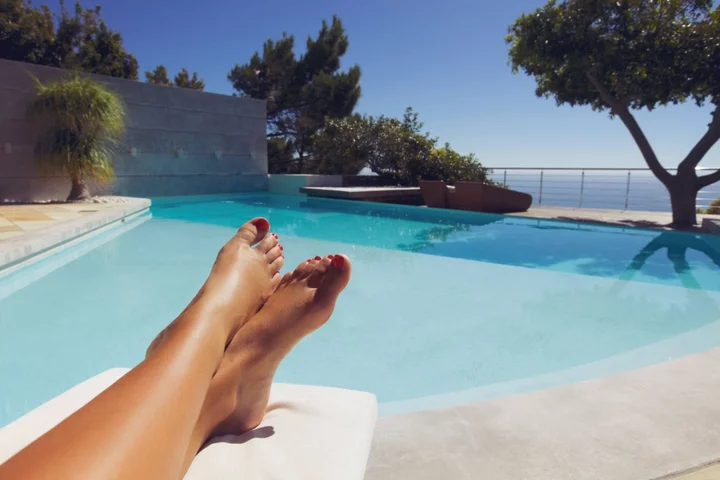Summer holidays are in full swing – and it’s very hot in Europe.
Returning with a sun-kissed glow is always a bonus, but is lounging around on sunbeds ever truly safe?
“As UV rays from the sun reach our skin, they stimulate the production of melanin, a pigment responsible for giving our skin its colour. Melanin acts as a natural defence mechanism, as it absorbs UV radiation and helps protect the skin from damage,” says Dr Tim Clayton, consultant dermatologist at Pall Mall Medical in Manchester.
“Increased melanin production leads to tanning of the skin, which is the body’s way of trying to shield itself from further UV exposure.”
So, if we are sunbathing to tan, our skin is always defending itself.
Is it OK to sunbathe for a short amount of time?
The longer you’re exposed to the sun, the worse the impact and damage may be.
“Excessive and unprotected sun exposure, especially with frequent sunburns, increases the likelihood of developing skin cancer, including basal cell carcinoma, squamous cell carcinoma, and melanoma,” says Clayton.
Even if a tan develops without any visible signs of sunburn over a shorter period of time, the DNA in your skin cells can still be damaged, notes Clayton. “The DNA damage caused by UV radiation increases the risk of skin cancer, including the most dangerous form, melanoma.”
What about SPF?
“Sunbathing, even with the use of sunscreen, still carries some risks. While sunscreen can provide some level of protection, it is not foolproof, and other factors should be taken into consideration,” he explains.
While sunscreen can help reduce the amount of UV radiation that penetrates the skin, it does not completely block it. “Some UV radiation can still reach the skin, increasing the risk of DNA damage, premature ageing, and skin cancer.”
A lot of the time, the protection we use does not actually work as it should.
“Sunscreens are designed to reduce the amount of UV radiation that reaches the skin, but they are not perfect barriers. Factors such as inadequate application, insufficient SPF, and not reapplying sunscreen regularly can compromise its effectiveness. Additionally, some areas of the body, like the eyes and lips, may not be adequately protected by sunscreen alone,” Clayton continues.
Equally, we may expose ourselves to too much sun, because we think it will be safe.
“Wearing sunscreen may give a false sense of security, leading individuals to stay in the sun for longer periods, or neglect other sun-safe practices, such as seeking shade or wearing protective clothing. Sunscreen should be used as part of a comprehensive sun protection strategy, rather than relying on it as the sole means of protection.”
We are not always the best at applying it, either. Sunscreen application requires proper technique and thorough coverage to be effective. Many of us don’t apply enough sunscreen, miss certain areas, or fail to reapply it when needed. “These application errors can reduce the sunscreen’s effectiveness and leave the skin vulnerable to UV damage,” he says.
Is a tan always bad for my skin?
However much you may want to look bronzed, it is not safe.
“While a tan is often seen as a desirable aesthetic for some individuals, it is important to understand that any change in skin colour, due to sun exposure, indicates damage to the skin.”
How can I get a tan instead?
A fake tan may have to be the answer if you want to protect your skin and get a glow.
As Clayton says: “Self-tanning products or spray tans can provide a safer alternative to achieve a tanned appearance without subjecting the skin to harmful UV radiation.”
Read MoreCharity boss speaks out over ‘traumatic’ encounter with royal aide
Ukraine war’s heaviest fight rages in east - follow live
A beginner’s guide to pickling your homegrown fruit and veg
Messages urging smokers to quit could be placed inside cigarette packs
King and Queen ‘utterly horrified’ by Hawaii wildfires in letter to Joe Biden

